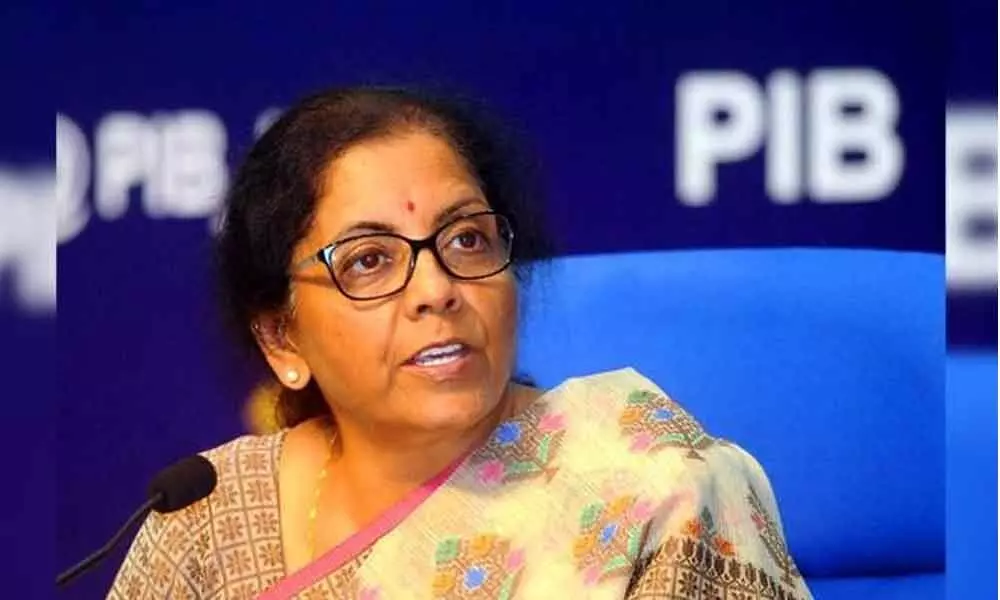Live
- VIP Treatment: Exclusive Benefits for High Rollers in Online Casino
- LS polls: Union Minister Bhagwanth Khuba, Dingaleshwara seer, Priyanka Jarkiholi file nominations in K'taka
- Amid show of strength, Congress’ Praniti Shinde files nomination from Solapur
- Tamil Nadu Police gives clean report to Isha Foundation in missing volunteers case
- Home Minister Amit Shah to address public meeting in Goa on April 24
- Gurgaon Open: M Dharma fires 67 for two-shot lead on penultimate day
- Sharad Pawar made many attempts to finish Shiv Sena, claims Maha minister
- Former England opener Raman Subba Row dies aged 92
- IPL 2024: Impact player rule is affecting the progress of half all-rounders, says Zaheer Khan
- ‘Teppa samudram’ review: Entertains with twists and turns
Just In
Come April 1, 10 government banks will become 4


Union Cabinet okays mega merger of public sector banks; Andhra Bank will slip into history
New Delhi: The Union Cabinet on Wednesday approved amalgamation of 10 public sector banks, including Allahabad Bank and OBC, to create large four state-owned lenders with effect from April 1, Finance Minister Nirmala Sitharaman said.
These will be in addition to State Bank of India, Bank of Baroda, and Bank of India. Following the consolidation, there will be seven large public sector banks (PSBs), and five smaller ones. There were as many as 27 PSBs in 2017.
As per the mega consolidation plan, Hyderabad-based Andhra Bank will slip into history as it and Corporation Bank will be merged with Union Bank of India. Oriental Bank of Commerce and United Bank of India will merge into Punjab National Bank and Syndicate Bank into Canara Bank and Allahabad Bank into Indian Bank.
"Sticking to the April 1, 2020 deadline, banks are fully on board. The Cabinet may have given the decision today, they were on course and doing everything that requires to be done so that this (amalgamation) will be effective from April 1," said Sitharaman, who had announced the largest consolidation in the banking space in August last year. The merger would result in creation of seven large PSBs with scale and national reach, with each amalgamated entity having business of over Rs 8 lakh crore. "The Mega consolidation would help create banks with scale comparable to global banks and capable of competing effectively in India and globally. Greater scale and synergy through consolidation would lead to cost benefits which should enable the PSBs enhance their competitiveness and positively impact the Indian banking system," a release said.
In addition, consolidation would also provide impetus to amalgamated entities by increasing their ability to support larger ticket-size lending and have competitive operations by virtue of greater financial capacity. The adoption of best practices across amalgamating entities would enable the banks improve their cost efficiency and risk management, and also boost the goal of financial inclusion through wider reach, it added.
Further, with the adoption of technologies across the amalgamating banks, access to a wider talent pool and a larger database, PSBs would be in a position to gain competitive advantage by leveraging analytics in a rapidly digitalising banking landscape. Last year, Dena Bank and Vijaya Bank were merged with Bank of Baroda.
Prior to this, the government had merged five associate banks of SBI and Bharatiya Mahila Bank with the State Bank of India. Citing an example of merger of Dena Bank and Vijaya Bank with Bank of Baroda, Sitharaman said the operating profit of the resulting lender has improved and retail loans are now sanctioned in 11 days (average) from 23 days earlier.
Meanwhile, sources said the banks which are going to be amalgamated would soon be announcing their share-swap ratios on stock exchanges as the deadline is approaching fast. The anchor bank Punjab National Bank will become the country's second largest bank, with business size of Rs 17.94 lakh crore, after SBI which has business of over Rs 52 lakh crore. Bank of Baroda will become the third largest bank, followed by Canara Bank, Union Bank of India, Bank of India, and Indian Bank. The other PSBs are Central Bank of India, Indian Overseas Bank, UCO Bank, Bank of Maharashtra, and Punjab and Sind Bank.

© 2024 Hyderabad Media House Limited/The Hans India. All rights reserved. Powered by hocalwire.com






